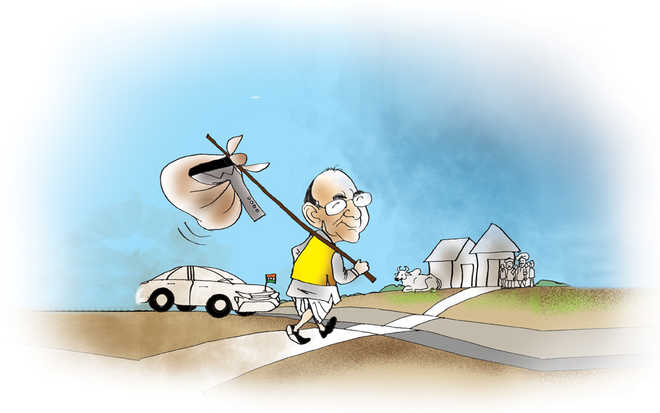
Illustration by Sandeep Joshi
Harish Khare
Just as Finance Minister Arun Jaitley was warming up for the Budget speech, news was trickling in of the BJP candidates trailing in the three byelections, two for the Lok Sabha and one for the Assembly, in Rajasthan. By the time the two Budget speeches — one by the Finance Minister and the second by the Prime Minister —were over, the counting was also over and the ruling party had been handed down a decisive rebuff. An even more comprehensive a defeat was slammed down the BJP’s throat in the two byelections in West Bengal; for the Uluberia Lok Sabha seat, the victory margin for the TMC candidate was a staggering 2,89,557. Hence, the million Renminbi question: has Finance Minister Arun Jaitley’s 2018-2019 Budget ensured that the BJP and its NDA allies get home dry in the next Lok Sabha elections, whenever it is held? The answer is not all that self-evident, except may be to the most partisan mind. Before the latest Rajasthan and West Bengal bypoll verdicts we had the Gujarat Assembly results in December 2017. The BJP, it need be recalled, had barely managed to scrape through, despite all the heavy lifting by the Prime Minister. The writing on the wall was clear. Any intelligent analyst could draw the inference: the rural economy was hurting and the farmers were in distress and had more than one reason to feel angry and unhappy with the ruling party. The shadow of the Gujarat verdict is quite discernible on Arun Jaitley’s performance on Thursday. The Finance Minister has discovered the garib and has felt himself compelled to make a pretence of quelling the farmers’ anger, just as he has felt he had the political luxury of giving a cold shoulder to the urban middle classes, especially the salaried segment. After all, the urban middle classes have nowhere else to go; instead, they are being asked to feel satisfied with all the promises of good governance that have been held out all these years.At the very outset, the Finance Minister cockily asserted that the government would do the right thing by the economy, without worrying about the political costs; a brave statement, any day. Yet, it need be recognised that the Budget has increasingly been reduced to an exercise in talking the economy up. The occasion gives everybody and his second cousin — the economists, the market “experts”, the chambers of commerce, the pink press, the business channels, the corporate crowd, the ruling party’s ministers and minions — to find a reason to celebrate “growth”. It is also obligatory to hail the Finance Minister for good intentions and for giving a few policy breaks to those who live in “Bharat”. It is regarded as bad form and bad punditry and bad taste to raise questions of capacity or competence of the government to implement the schemes so grandly unveiled. But then, the hidden — or perhaps not so hidden — purpose is to create a political momentum for the government of the day. And, in any case, the current NDA government cannot be accused of lacking in the art of self-promotion and in manufacturing a buzz.Still, economic progress and growth are not created by political bluff and bluster. At the end of the day, every finance minister’s primary duty is to produce a sound, conscientious and prudent management of the national resources and finances towards collective well-being. It is a grave burden and requires formidable skills and competence. Arun Jaitley has been the most hemmed in Finance Minister since Independence. His tragedy is that he has simply not had the luxury of disenthralling himself of his own Prime Minister’s slogans and shibboleths. It was no surprise, though a bit disappointing, that even in his Budget disquisition he felt constrained to pay obeisance to the Prime Minister’s humble origins. Immovable, populist pressures and electoral calculations apart, no finance minister has the total luxury to ignore the long-terms interests of the Indian economy; and, these terms are defined — rather laid down — by outsiders, the international investor, the World Bank/IMF, the rating agencies, and our own corporate houses. Each government is obliged to demonstrate its ability and willingness to stay the course. And, to his credit, Arun Jaitley has eschewed the temptation of recklessness, in this election year. Yet, elections have to be won. And, every economy scenario produces its own tapestry of pain and profits. After four years of wooing the “investment” community, of cajoling the corporate India to invest and create jobs and to usher in achhe din, of beseeching the Davos crowd to come to the “Make in India” show, time has come to woo the Indian voter — without turning off the “investment” constituency. To a certain extent, the Finance Minister has been mindful of the supreme requirement to maintain the creditworthiness of the Indian economy. To that extent, it is a Budget of a regime that feels confident of winning the next election and, therefore, is not in a hurry to sell the store away. It is perhaps unfair to try to judge a finance minister’s budget by the templates prescribed by Dr Subramanian Swamy, a man who desperately wanted to be finance minister, but had been assiduously kept away from coming anywhere near North Block. A few days before the Budget, Dr Swamy, who legitimately fancies himself as more knowledgeable an economist than Arun Jaitley, had argued that economic reforms and vikas alone just did not win elections. According to Dr Swamy, the only way the BJP could win the 2019 Lok Sabha was to go to the people on an aggressive Hindutva plank. In other words, the Kasganj option. Dr Swamy may still prevail over Jaitley.
